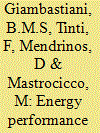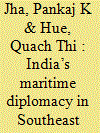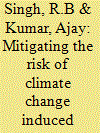| Srl | Item |
| 1 |
ID:
093888


|
|
|
|
|
| Publication |
2010.
|
| Summary/Abstract |
Conflict prevention, more than other fields of international politics and foreign policy, is characterized by a multiplicity of state and non-state actors, giving rise to particularly complex coordination challenges. This article evaluates the extent to which the German response to these challenges, the action plan for civilian conflict prevention, has succeeded in its aim of improving coordination to increase policy coherence between different governmental agencies as well as with civil society actors. It finds that although the general approach is indeed promising, the government's lack of commitment prevents it from tapping into the action plan's full potential.
|
|
|
|
|
|
|
|
|
|
|
|
|
|
|
|
| 2 |
ID:
128559


|
|
|
|
|
| Publication |
2013.
|
| Summary/Abstract |
This author consider how the founder of the Naval Review might have seen the position of the Royal navy today, and how he might have set out to improve it, or advise his successors how to improve it. He suggests the concept is more in line with current maritime needs that it has been given credit for, and speculates on its future.
|
|
|
|
|
|
|
|
|
|
|
|
|
|
|
|
| 3 |
ID:
127232


|
|
|
|
|
| Publication |
2014.
|
| Summary/Abstract |
Use of shallow geothermal energy, in terms of ground coupled heat pumps (GCHP) for heating and cooling purposes, is an environmentally-friendly and cost-effective alternative with potential to replace fossil fuels and help mitigate global warming. Focusing on the recent results of the GEO.POWER project, this paper aims at examining the energy performance strategies and the future regional and national financial instruments for large scale introduction of geothermal energy and GCHP systems in both residential and industrial buildings.
After a transferability assessment to evaluate the reproducibility of some outstanding examples of systems currently existing in Europe for the utilisation of shallow geothermal energy, a set of regulatory, economic and technical actions is proposed to encourage the GCHP market development and support geothermal energy investments in the frame of the existing European normative platforms. This analysis shows that many European markets are changing from a new GCHP market to growth market. However some interventions are still required, such as incentives, regulatory framework, certification schemes and training activities in order to accelerate the market uptake and achieve the main European energy and climate targets.
|
|
|
|
|
|
|
|
|
|
|
|
|
|
|
|
| 4 |
ID:
187141


|
|
|
|
|
| Summary/Abstract |
India–Southeast Asia defence cooperation has not been highlighted much, primarily to not give out wrong signals about India’s power projection outlook. With India steadfastly maintaining that it is a benign nation and not a revisionist power, engagement in the defence domain with Association of Southeast Asian Nations (ASEAN) has been attempted in five ways. The first includes India’s engagement in ASEAN defence mechanisms, such as ASEAN Defence Ministers’ Meeting (ADMM) Plus; and the participation of ASEAN nations in the Milan series of biennial meetings and Indian Ocean Naval Symposium (IONS). The second dimension is India’s legitimate interest in the security of the Malacca Strait as a funnel state. The third dimension is developing synergies between the defence industries in Southeast Asia with the Indian defence industrial complex. The fourth angle of engagement is India’s position as the net security provider in the Indian Ocean Region (IOR). The fifth critical aspect is developing maritime cooperative mechanism and developing a counter to the Chinese “string of pearls” strategy.
|
|
|
|
|
|
|
|
|
|
|
|
|
|
|
|
| 5 |
ID:
132487


|
|
|
|
|
| Publication |
2014.
|
| Summary/Abstract |
The world's climate is continuing to change at rates that are projected to be unprecedented in recent human history. The risks of climate change and extreme climatic events such as drought and ?ood have dramatic impacts on economy and natural systems. Agriculture, livestock and water resources are among the most vulnerable systems. Resilience and adaptive capacity of traditional networks and land use systems to cope with climate variability/extremes are weakening, while ' frequency and magnitude of climate variability and land use intensity are in rise. Thus it is important to take timely action in order to reduce the risk of climate change.
|
|
|
|
|
|
|
|
|
|
|
|
|
|
|
|